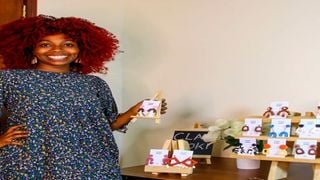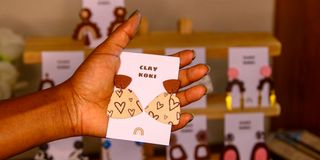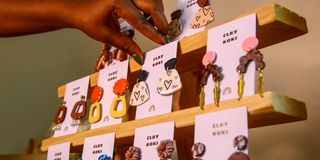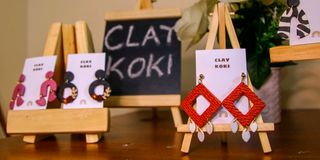
Jecinta Njoki, founder of Clay Koki, a start-up specialising in creating earrings made from polymer clay at her home in Nairobi on October 28, 2023.
| Wilfred Nyangaresi | Nation Media GroupEnterprise
Premium
Thriving pandemic-era jewellery company that began as a pastime
What you need to know:
- For Jecinta Njoki, “random” is what led her to start a side company creating polymer clay artwork.
- Ms Njoki is starting new Internet channels to reach a wider market and boost her online presence.
When you enter Jecinta Njoki’s workplace, one wouldn’t tell she is a biochemistry graduate, as the vast collection of large, vivid “statement” earrings in different colours and styles is the first thing that draws your attention.
While some are being photographed for marketing purposes, others lie on the table, packed and ready for dispatch. It’s all owing to the materials Ms Njoki got when trying to find activities to keep her daughter engaged during the Covid-19 pandemic.
For Njoki, “random” is what led her to start a side company creating polymer clay artwork.

Some of the jewellery by Jecinta Njoki Kimani, founder of Clay Koki, a startup specializing in creating statement earrings made entirely from polymer clay, on display at her home in Utawala on October 28, 2023.
“I had to find ways to occupy my two-year-old toddler during the pandemic, and I went online to search for polymer clay after noticing that many parents were buying it. That was when I initially got the idea I could make and sell polymer clay crafts,” she says.
Every kind of oven-cured polymer clay is a pliable PVC-based substance produced in different hues and finishes.
Unlike most crafts, people of all ages and skill levels can successfully work with it since it does not need specialised tools and serves as a cheap primary or alternative medium for different artistic expressions.
In contrast to modelling clay, polymer clay is lighter, hardens with heat, is water-resistant, and can be repeatedly moulded and baked in a typical oven.
“I did a tonne of studying how to use polymer clay to earn money from home. When I worked on a few items after getting my first batch locally, I understood it was not only that. It neither provided me with the desired quality nor resembled what I had seen online. I chose to get polymers from Amazon,” says Njoki.
The entrepreneur gradually invested in resources she did not have to begin with after using her capital of about Sh40,000 to purchase high-quality polymer clay, a conditioning machine, sculpting supplies, and other jewellery tools.
She founded Clay Koki, a startup specialising in statement earrings made of polymer clay with a wide variety of collections to suit various tastes that are lightweight and have stunning designs.

Some of the jewellery Clay Koki produces on display at the start-up founder Jecinta Njoki’s home in Nairobi on October 28, 2023.
“I prepare the polymer clay after receiving it so that it becomes softer and simpler to work with. I create the sculptures and designs for the earrings after the clay is ready. I pack everything with metal clips inside a big oven-baking bag. To eliminate smells and keep the oven odour-free as I bake them,’’ she says, explaining that she then cools them outdoors to get a hardened earring.
Even though her proudest achievement is seeing people wearing her pieces, Ms Njoki admits she has had her fair share of challenges. Pricing, locating raw materials, and marketing have all been challenging since polymer clay is still relatively new in Kenya.
“I have to order my supplies from stores like Amazon. This is quite expensive. Because so few people are familiar with polymer clay earrings, I also need to be very careful with pricing,” she states and points out that she is cautious not to appear like she is overpricing her products, which range from Sh400 to Sh1,000 depending on the size and the time spent producing each piece.
Numerous foreign artists have acknowledged her work, including Cookies and Charms, a well-known Malaysian clay cutter and beat roller.
“I like how you can wear a basic outfit and earrings can instantly enhance your look. They somehow accentuate your looks because they are so close to your face. They’re conversation starters. They’re wearable art,” she notes.
Ms Njoki is starting new Internet channels to reach a wider market and boost her online presence. She also plans to offer her vast knowledge and expertise in making polymer clay earrings and other exquisite products on these platforms.

Some of the jewellery by Jecinta Njoki Kimani, founder of Clay Koki, a startup specializing in creating statement earrings made entirely from polymer clay, on display at her home in Utawala on October 28, 2023.
“The market for polymer clay is growing, and I want to inspire young people on how they can make the most of their free time and even earn money from doing creative things,” she says.
Through her company, Ms Njoki hopes to demonstrate that women, particularly mothers, can work and balance their personal and family responsibilities while still producing handmade products.
She also seeks to promote entrepreneurship as a means of generating income, achieving financial independence, and bolstering the local economy.
“I plan to proceed to mass production, which means employment creation. I also intend to make these materials more accessible in Kenya and Africa. I would also love to collaborate with other brands,” she says.





